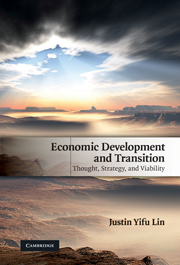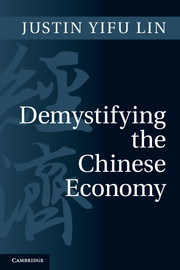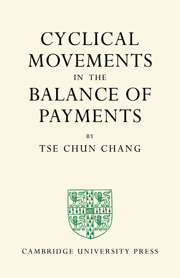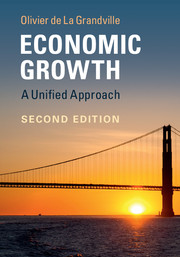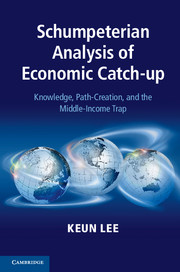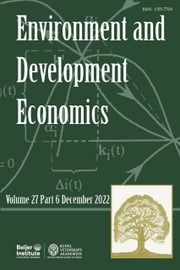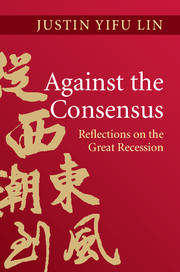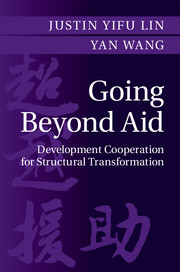Economic Development and Transition
Thought, Strategy, and Viability
£52.00
- Author: Justin Yifu Lin, Peking University, Beijing
- Date Published: February 2009
- availability: Available
- format: Hardback
- isbn: 9780521514521
£
52.00
Hardback
Other available formats:
Paperback, eBook
Looking for an inspection copy?
This title is not currently available on inspection
-
In Economic Development and Transition, renowned development economist Justin Yifu Lin argues that economic performance in developing countries depends largely on government strategy. If the government plays a facilitating role, enabling firms to exploit the economy's comparative advantages, its economy will develop successfully. However, governments in most developing countries attempt to promote industries that go against their comparative advantages by creating various kinds of distortion to protect nonviable firms in priority industries. Failing to recognize the original intention of many distortions, most governments in transition economies attempt to eliminate those distortions without addressing firms' viability problems, causing economic performance to deteriorate in their transition process. Governments in successful transition economies adopt a pragmatic dual-track approach that encourages firms to enter sectors that were suppressed previously and gives necessary support to firms in priority industries before their viability issue is addressed.
Read more- Written by China's most respected economist who has recently been appointed as Chief Economist of the World Bank
- Explains why developing countries have failed to realise their economic potential and shows how we can address this problem
- Contains a succinct yet comprehensive literature review allowing readers to understand important issues and concepts in contemporary development theory
Reviews & endorsements
'Development and transition pose extremely difficult challenges. In these masterly Lectures, Justin Lin, now the World Bank's Chief Economist, brings to these complex subjects a profound understanding of the problems they raise and also unusual insights from his first-hand experience with China's spectacular performance. The Lectures are a tour de force.' Jagdish Bhagwati, Columbia University
See more reviews'No economist has a deeper understanding of the policies that have given rise to the Chinese economic miracle than Justin Yifu Lin. He has not only influenced the thinking of government and business leaders in China, but also of economic analysts in the United States and Western Europe. This is essential reading for anyone who wants to understand the likely course of the global economy over the next generation.' Robert Fogel, Nobel Laureate, University of Chicago
'Justin Lin, who has been at the centre of the policy debates in China since the 1980s, has provided a masterly account of the economic rationale of the Chinese path of transition from the plan to the market. His book is essential reading for understanding the Chinese economic miracle.' Deepak Lal, University of California, Los Angeles
'Justin Lin's Marshall lectures provide an unrivalled opportunity to both understand the spectacular rise of Asian economics over the past several decades and to cast a jaundiced eye on standard explanations of development by economists. Western training in economics combined with an insider's exposure to China's development has given him both a sceptical view of standard western development economics and an intimate insider's view of the details of the pragmatic approach that has characterized Asian and particularly Chinese spectacular development.' Douglass C. North, Nobel Laureate, Washington University, St Louis
'This is an important book in many ways. Two strike me as central. Professor Lin is a scholar of great insight who has experienced and participated in the policy debate in China, the largest and fastest growing economy thus far. His intimate insight into policy formulation in a transitional economy informs his rigorous theoretical analysis and brings the development part of growth and development back to center stage. Second, the analysis of the consequences of aligning or misaligning the evolving endowments of an economy with its evolving growth strategy is insightful and surely right. It has its roots in trade theory and comparative advantage. But turning that into a body of dynamic analysis of growth strategy and policy is a major achievement.' Michael Spence, Nobel Laureate, Stanford University
'Justin Lin's study combines economic theory, institutional knowledge, quantitative data, and an appreciation for the importance of starting conditions in determining the success of different plan for economic development. His most unique contribution is the emphasis on how different starting points dictate very different optimal policies, which explains why shock therapy policies have been less than great successes in formerly communist countries like Russia, whereas China's more gradualist elimination of state enterprises has been working very well. Lin's point of view is controversial, but highly stimulating. I strongly recommend this book as an insightful study that interprets an impressive amount of actual evidence of attempts at economic development through the powerful lens of economic analysis.' Gary Becker, Nobel Laureate, University of Chicago
'This is a brilliant and revolutionary book explaining why some developing countries have succeeded and others failed. Lin argues that it is ideas, even more than interests, that matter. Those countries that failed attempted to modernize through a strategy of modernization focusing on heavy industry - that he characterizes as defying their comparative advantage. By contrast, governments in the successful countries (mostly in East Asia) facilitated the development of industries and the adoption of technology in a developing country following their comparative advantage determined by their endowment structure at every phase of development. Successful governments did intervene in their economy - the Washington consensus was wrong. But they did so in the right way. The World Bank is lucky to have as its Chief Economist someone willing and able to look at development with fresh eyes, free from the dogmas of the past.' Joseph Stiglitz, Nobel Laureate, Columbia University
Customer reviews
Not yet reviewed
Be the first to review
Review was not posted due to profanity
×Product details
- Date Published: February 2009
- format: Hardback
- isbn: 9780521514521
- length: 184 pages
- dimensions: 229 x 152 x 14 mm
- weight: 0.44kg
- contains: 7 tables
- availability: Available
Table of Contents
List of figures
List of tables
1. Development, transition and divergence
2. The search for a fundamental and changeable cause of prosperity
3. Aspiration and social thought of modernization
4. Development strategy, viability and performance
5. Viability and strategies of transition
6. Development strategy and development and transition performances: empirical analysis
7. Why are East Asian economies so special? Are there any general lessons to be learned from East Asian development and transition experiences?
8. Toward a right development and transition strategy
Appendix I. Development strategy and economic institutions in developing countries
Appendix II. Data description
References
Index.
Sorry, this resource is locked
Please register or sign in to request access. If you are having problems accessing these resources please email [email protected]
Register Sign in» Proceed
You are now leaving the Cambridge University Press website. Your eBook purchase and download will be completed by our partner www.ebooks.com. Please see the permission section of the www.ebooks.com catalogue page for details of the print & copy limits on our eBooks.
Continue ×Are you sure you want to delete your account?
This cannot be undone.
Thank you for your feedback which will help us improve our service.
If you requested a response, we will make sure to get back to you shortly.
×
